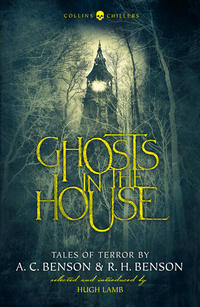
Ghosts in the House: Tales of Terror by A. C. Benson and R. H. Benson
Father Brent tossed away his cigarette and lit another.
He seemed a very sensible person, I thought, and his manner of speaking was serene and practical.
‘My friend was a widower,’ he went on, ‘but had one boy, about eleven years old, who, I remember, was to go to school after Christmas. I asked Franklyn, my friend, why Jack had not gone before, and he told me, as parents will, that he was a peculiarly sensitive boy, a little hysterical at times and very nervous, but he was less so than he used to be and probably, his father said, if he was allowed time, school would be the best thing for him. Up to the present, however, he had shrunk away from sending him.
‘“He has extraordinary fancies,” he said, “and thinks he sees things. The other day—” and then Jack came in, and he stopped, and I clean forgot to ask him afterwards what he was going to say.
‘Now if any one here has ever been to Cornwall, he will know what a queer county it is. It is cram-full of legends and so on. Every one who has ever been there seems to have left his mark. You get the Phoenicians in goodness knows what century; they came there for tin, and some of the mines still in work are supposed to have been opened by them. Cornish cream too seems to have been brought there by them – for I need not tell you perhaps that the stuff is originally Cornish and not Devon. Then Solomon, some think, sent ships there – though personally I believe that is nonsense; but you get some curious names – Marazion, for instance, which means the bitterness of Zion. That has made some believe that the Cornish are the lost tribes. Then you get a connection with both Ireland and Brittany in names, language, and beliefs, and so on – I could go on for ever. They still talk of “going to England” when they cross the border into Devonshire.
‘Then the people are very odd – real Celts – with a genius for religion and the supernatural generally. They believe in pixies; they have got a hundred saints and holy wells and holy trees that no one else has ever heard of. They have the most astonishing old churches. There is one convent – at Lanherne I think – where the Blessed Sacrament has remained with its light burning right up to the present. And lastly, all the people are furious Wesleyans.
‘So the whole place is a confusion of history, a sort of palimpsest. A cross you find in the moor may be pagan, or Catholic, or Anglican, or most likely all three together. And that is what makes an explanation of what I am going to tell you such a difficult thing.
Конец ознакомительного фрагмента.
Текст предоставлен ООО «ЛитРес».
Прочитайте эту книгу целиком, купив полную легальную версию на ЛитРес.
Безопасно оплатить книгу можно банковской картой Visa, MasterCard, Maestro, со счета мобильного телефона, с платежного терминала, в салоне МТС или Связной, через PayPal, WebMoney, Яндекс.Деньги, QIWI Кошелек, бонусными картами или другим удобным Вам способом.
Вы ознакомились с фрагментом книги.
Для бесплатного чтения открыта только часть текста.
Приобретайте полный текст книги у нашего партнера:
Полная версия книги
